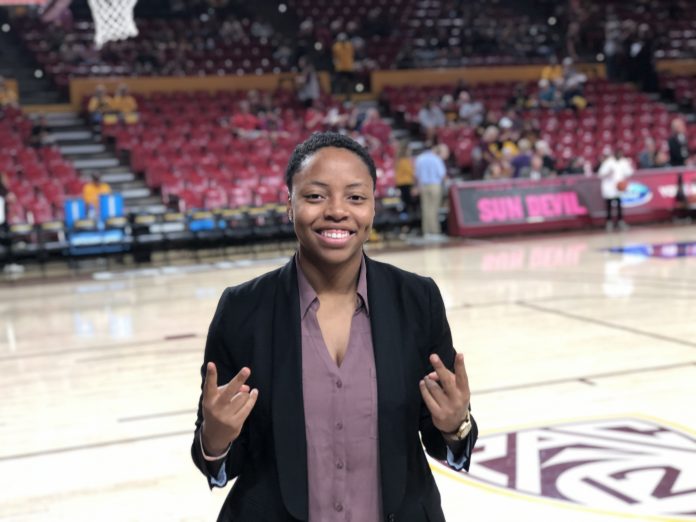“I’m interested in whatever’s interested in me! At the end of the day, all I want to do is use my skills to help make the world safe for Black, Brown and Indigenous people of color, as well as trans and gender non-conforming people.”
This motto appears on the website of former William and Mary women’s basketball player Misha Jones ’19. Jones, who played basketball at the College from 2015-2019, eventually decided to pursue a career in journalism after she graduated — albeit through by an unconventional route.
“I came to William and Mary wanting to major in something communications, journalism, you know, in that realm, but obviously we don’t have that at William and Mary,” Jones said. “So for me, the next best option was either create my own major, which was like a headache in itself, or do film and media studies.”
Since Jones was not able to major in journalism, her goal had to be put on hold for a few years. After she graduated from the College with a degree in film and media studies, Jones set out to pursue her career fully, which led her to a master’s program at Arizona State University’s Walter Cronkite School of Journalism and Mass Communication.
“The reason why I chose grad school is because I knew that if I wanted to launch myself into a journalism career, I would probably need some more formal journalism training,” Jones said. “ASU’s Cronkite School, it was an accelerated program, so I started last fall and I’m already done with it. And it was an opportunity to explore a place I’d never been to, to have some more independence, and to really take the time to hone my craft.”
At the Cronkite School, Jones went through something resembling a journalism “boot camp.”
“I started off the first semester, and you’re kind of all hands on deck,” Jones said. “You learn the basics of digital journalism, writing, the basics of photography, the basics of making packages and broadcast journalism, just the basics of everything.”
She also used her free time to gain journalism experience in lots of different fields.
“I got lucky that I found an extracurricular like group called the Walter Cronkite sports network,” Jones said. “I was able to cover the women’s basketball team as a beat reporter and as a photographer, which was really cool… I also got to cover some baseball and some softball.”
Jones graduated from Arizona State in fall 2020 and then began working as a freelance journalist. Throughout her time writing as an undergraduate, graduate student and freelancer, Jones’s identity as a Black, queer woman has informed her work as a journalist and helps drives her passion to write and tell stories.
“The simple fact of it is, in journalism there’s way too many white men,” Jones said. “There are way too many people who don’t look like me making big decisions. And from the higher ups, the editors, the CEOs and CFOs, when they make decisions about the kind of content that they put out, it slowly filters out all the stories that really pertain and hit home for people who look like me and people who don’t look like me, then we have a problem because we have a lack of information reaching communities that need it the most. For me, as much as I try to take myself out of my own shoes, when I’m writing, when I ’m reporting, I can’t help but be a queer Black woman. If I’m seeing something about the NBA and all of their social justice initiatives, I’m going to feel some type of way if you don’t put in there something about the WNBA and how they set the tone for the NBA.”
As a journalist, Jones is constantly learning and working to make the world a better and safer place for all people and communities that are oppressed and affected by white supremacy.
“There are just some fundamental truths, like in this country, white supremacy is king and white supremacy touches every aspect of our lives, whether we choose to see it or not,” Jones said. “And when I say white supremacy, it doesn’t automatically equate to racial prejudice. It also trickles down into transphobia and homophobia because the gender binary is completely a white supremacist social construct. So, it’s just about making sure that everybody who comes across my work understands where I’m coming from and why it’s necessary to go so hard for these communities that are just being treated poorly, horribly, terribly.”
Jones recently accepted a position as an audio editor and associate producer for Complex Networks. But regardless of where her career takes her, she will continue to stay true to herself and her identity.
“In my opinion, I think it’s a detriment to journalism as a whole to remove a person and a person’s perspective from the work that they do,” Jones said. “I think at the end, our goal as journalists should be to connect with people with human beings, provide them with a service, provide them with entertainment, you know, whatever it is that you’re doing, and I just don’t think it’s smart to try to pretend like we’re robots. And that’s not to say that you shouldn’t check yourself because you absolutely should…But if what you’re doing is going to, at the end of the day, empower marginalized people, marginalized communities, then you’re in the right place. And I think that’s just the baseline of everything that I do; Is this making anything better for anybody else.”

